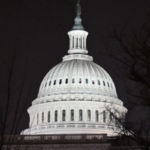By Joe Kefauver
Texas has a credit card debt problem. According to WalletHub’s latest report, Texans collectively owe over $111 billion in credit card debt. On average, this translates to nearly $10,000 in debt per household.
And this problem shows no signs of slowing down. In the second quarter of 2024 alone, Texas saw a staggering $3.33 billion increase in credit card debt.
What’s driving Texas’s credit card debt crisis? While inflation is undeniably contributing, there’s another key factor: swipe fees collected by Visa and Mastercard on every credit card transaction.
Swipe fees are set by Visa and Mastercard and presented as “the cost of doing business” for retailers. Typically ranging from 2 to 4 percent of the cost of a credit card transaction, retailers often pass these costs along to consumers in the form of higher prices.
At first glance, a 2 to 4 percent fee might not seem significant. However, these costs add up quickly. In fact, retailers collectively pay $224 billion annually in swipe fees, which are particularly burdensome for small businesses — often representing their second-highest monthly operational cost. In Texas alone, businesses paid over $1 billion in swipe fees for sales taxes. The result? Families are left with an invisible $1,100 annual bill for swipe fees.
At the same time, Texans are reliant on credit cards — Texas now ranks 12th among the states where inflation is pushing residents to use their credit cards more often. In fact, 22 percent of Texas adults have increased their credit card usage due to rising prices, and 36 percent rely on credit cards to meet their spending needs. Overall, 42 percent of Texashouseholds are unable to afford basic needs, including housing, transportation, health care, among others.
Meanwhile, as Texas families struggle to afford the basics, banks relentlessly market the very credit cards that push them further into debt. Visa, Mastercard, and big banks have perfected selling the “American Dream” by enticing consumers with promises of luxury travel and other extravagant cashback rewards.
To paint the picture more clearly, let’s use Capital One as an example. The company allocated over $4 billion of its budget toward marketing — including rewards card advertising. Who does Capital One advertise to? Everyday Americans who cannot afford these cards. Two out of three Americans in debt continue to chase rewards points, which only worsens their financial situations.
How do swipe fees fit into this? Banks like Capital One use them to pay for their often-predatory rewards programs. By curbing swipe fees, policymakers can begin holding Visa, Mastercard, and the big banks accountable for their role in fueling the credit card debt crisis in Texas and across the country.
Fortunately, there are solutions. Texas lawmakers recently introduced SB 2025/HB 4124, aiming to eliminate swipe fees from the tax and gratuity portions of a bill. And Texas isn’t alone—13 other states and Washington, D.C., introduced similar legislation in 2025, with Illinois leading the charge by passing the Interchange Fee Prohibition Act (IFPA).
Meanwhile, Congress has also been sitting on the bipartisan Credit Card Competition Act (CCCA), which would introduce more competition in the credit card payment processing market. Right now, Visa and Mastercard dominate, setting swipe fees at will and squeezing retailers and consumers alike. By breaking up their monopoly, the CCCA could lower fees, ease financial pressure on small businesses, and curb aggressive credit card rewards marketing.
But we all know that getting major legislation through Congress is a Herculean task -- Texas lawmakers were smart to take matters into their own hands with SB 2025/HB 4124. We can’t afford to keep ignoring the financial strain of swipe fees. Lawmakers have a chance to act—giving Texans, and all Americans, a real shot at escaping mounting debt and reclaiming their financial independence.
Joe Kefauver is a Senior Adviser to Americans For A Modern Economy, an organization committed to ensuring that local, state, and federal policies reflect changing technologies that are reshaping the way consumers, businesses, and communities operate in the 21st century economy.











